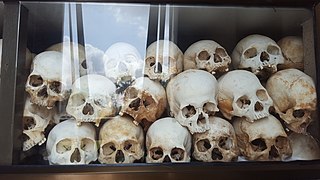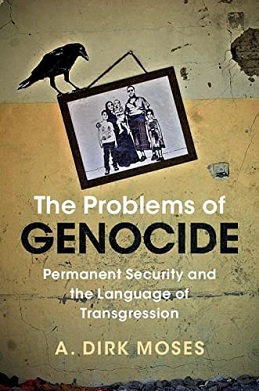
Genocide is violence that targets individuals because of their membership of a group and aims at the destruction of a people.
The Convention on the Prevention and Punishment of the Crime of Genocide (CPPCG), or the Genocide Convention, is an international treaty that criminalizes genocide and obligates state parties to pursue the enforcement of its prohibition. It was the first legal instrument to codify genocide as a crime, and the first human rights treaty unanimously adopted by the United Nations General Assembly, on 9 December 1948, during the third session of the United Nations General Assembly. The Convention entered into force on 12 January 1951 and has 153 state parties as of June 2024.

Raphael Lemkin was a Polish lawyer of Jewish descent who is known for coining the term genocide and campaigning to establish the Genocide Convention. During the Second World War, he campaigned vigorously to raise international awareness of atrocities in Axis-occupied Europe. It was during this time that Lemkin coined the term "genocide" to describe Nazi Germany's extermination policies.

"A Problem from Hell": America and the Age of Genocide (2002) is a book by American Samantha Power, at that time Professor of Human Rights Practice at Harvard's John F. Kennedy School of Government, which explores the United States's understanding of, response to, and inaction on genocides in the 20th century, from the Armenian genocide to the "ethnic cleansings" of the Kosovo War. It won the J. Anthony Lukas Book Prize and the Pulitzer Prize for General Non-Fiction in 2003.
Genocide definitions include many scholarly and international legal definitions of genocide, a word coined by Raphael Lemkin in 1944. The word is a compound of the ancient Greek word γένος and the Latin word caedō ("kill"). While there are various definitions of the term, almost all international bodies of law officially adjudicate the crime of genocide pursuant to the Convention on the Prevention and Punishment of the Crime of Genocide (CPPCG).
Political cleansing of a population is the elimination of categories of people in specific areas for political reasons. The means may vary and include forced migration, ethnic cleansing and population transfers.
Holocaust studies, or sometimes Holocaust research, is a scholarly discipline that encompasses the historical research and study of the Holocaust. Institutions dedicated to Holocaust research investigate the multidisciplinary and interdisciplinary aspects of Holocaust methodology, demography, sociology, and psychology. It also covers the study of Nazi Germany, World War II, Jewish history, antisemitism, religion, Christian-Jewish relations, Holocaust theology, ethics, social responsibility, and genocide on a global scale. Exploring trauma, memories, and testimonies of the experiences of Holocaust survivors, human rights, international relations, Jewish life, Judaism, and Jewish identity in the post-Holocaust world are also covered in this type of research.
Barbara Harff is professor of political science emerita at the U.S. Naval Academy in Annapolis, Maryland. In 2003 and again in 2005 she was a distinguished visiting professor at the Strassler Center for Holocaust and Genocide Studies at Clark University. Her research focuses on the causes, risks, and prevention of genocidal violence.
Uğur Ümit Üngör is a Dutch–Turkish academic, historian, sociologist, and professor of Genocide studies, specializing as a scholar and researcher of Holocaust studies and studies on mass violence. He served as Professor of History at the Utrecht University and Professor of Sociology at the NIOD Institute for War, Holocaust and Genocide Studies.
Steven Leonard Jacobs is an American historian, Professor of the University of Alabama. He is specialized in Genocide and Holocaust Studies, Religion, History of Judaism, and Politics in the Middle East. Jacobs is a member of the International Association of Genocide Scholars and has served as First Vice-President and Secretary-Treasurer on the board of the organisation.

The assessment of risk factors for genocide is an upstream mechanism for genocide prevention. The goal is to apply an assessment of risk factors to improve the predictive capability of the international community before the killing begins, and prevent it. There may be many warning signs that a country may be leaning in the direction of a future genocide. If signs are presented, the international community takes notes of them and watches over the countries that have a higher risk. Many different scholars, and international groups, have come up with different factors that they think should be considered while examining whether a nation is at risk or not. One predominant scholar in the field James Waller came up with his own four categories of risk factors: governance, conflict history, economic conditions, and social fragmentation.

Anthony Dirk Moses is an Australian scholar who researches various aspects of genocide. In 2022 he became the Anne and Bernard Spitzer Professor of Political Science at the City College of New York, after having been the Frank Porter Graham Distinguished Professor of Global Human Rights History at the University of North Carolina at Chapel Hill. He is a leading scholar of genocide, especially in colonial contexts, as well as of the political development of the concept itself. He is known for coining the term racial century in reference to the period 1850–1950. He is editor-in-chief of the Journal of Genocide Research.

Prevention of genocide is any action that works toward averting future genocides. Genocides take a lot of planning, resources, and involved parties to carry out, they do not just happen instantaneously. Scholars in the field of genocide studies have identified a set of widely agreed upon risk factors that make a country or social group more at risk of carrying out a genocide, which include a wide range of political and cultural factors that create a context in which genocide is more likely, such as political upheaval or regime change, as well as psychological phenomena that can be manipulated and taken advantage of in large groups of people, like conformity and cognitive dissonance. Genocide prevention depends heavily on the knowledge and surveillance of these risk factors, as well as the identification of early warning signs of genocide beginning to occur.

Genocide studies is an academic field of study that researches genocide. Genocide became a field of study in the mid-1940s, with the work of Raphael Lemkin, who coined genocide and started genocide research, and its primary subjects were the Armenian genocide and the Holocaust; the Holocaust was the primary subject matter of genocide studies, starting off as a side field of Holocaust studies, and the field received an extra impetus in the 1990s, when the Bosnian genocide and Rwandan genocide occurred. It received further attraction in the 2010s through the formation of a gender field.

The relationship between the Armenian genocide and the Holocaust has been discussed by scholars. The majority of scholars believe that there is a direct causal relationship between the Armenian genocide and the Holocaust, however, some of them do not believe that there is a direct causal relationship between the two genocides.

Genocide is the intentional destruction of a people in whole or in part. The term was coined in 1944 by Raphael Lemkin. It is defined in Article 2 of the Convention on the Prevention and Punishment of the Crime of Genocide (CPPCG) of 1948 as "any of the following acts committed with intent to destroy, in whole or in part, a national, ethnical, racial, or religious group, as such: killing members of the group; causing serious bodily or mental harm to members of the group; deliberately inflicting on the group's conditions of life, calculated to bring about its physical destruction in whole or in part; imposing measures intended to prevent births within the group; [and] forcibly transferring children of the group to another group."

The Problems of Genocide: Permanent Security and the Language of Transgression is a 2021 book by Australian historian A. Dirk Moses. The book explores what Moses sees as flaws in the concept of genocide, which he argues allows killings of civilians that do not resemble the Holocaust to be ignored. Moses proposes "permanent security" as an alternative to the concept of genocide. The book was described as important, but his emphasis on security is considered only one factor to be causing mass violence.
This is a select annotated bibliography of scholarly English language books and journal articles about the subject of genocide studies; for bibliographies of genocidal acts or events, please see the See also section for individual articles. A brief selection of English translations of primary sources is included for items related to the development of genocide studies. Book entries may have references to journal articles and reviews as annotations. Additional bibliographies can be found in many of the book-length works listed below; see Further Reading for several book and chapter-length bibliographies. The External links section contains entries for publicly available materials on the development of genocide studies.

Below is an outline of articles on the academic field of genocide studies and subjects closely and directly related to the field of genocide studies; this is not an outline of acts or events related to genocide or topics loosely or sometimes related to the field of genocide studies. The Event outlines section contains links to outlines of acts of genocide.

Axis Rule in Occupied Europe: Laws of Occupation, Analysis of Government, Proposals for Redress is a 1944 book by Polish-Jewish lawyer Raphael Lemkin that is best known for introducing the concept of genocide, which Lemkin coined from the Greek word γένος with the Latin suffix -caedo.









